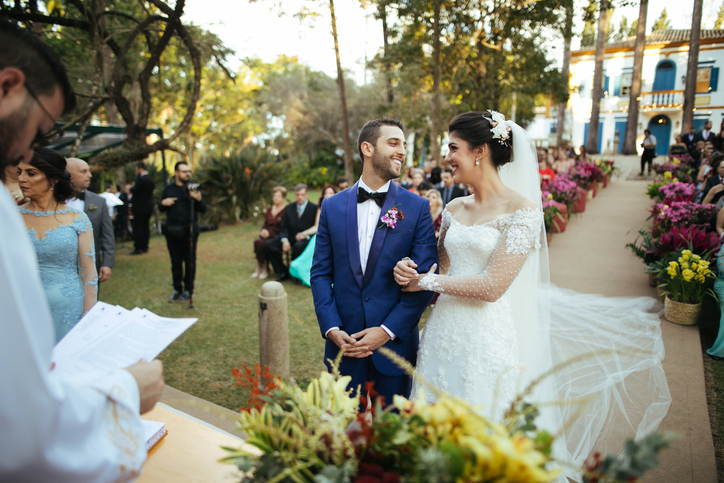Wedding insurance can help protect the amount of money that you’re spending on your big day. From sudden venue closures to severe weather disruptions, this specialized policy can act as a safeguard against a variety of sudden events. As you pour over guest lists and seating charts, here are some common risks that wedding insurance could help you cover. If you need help finding wedding insurance or managing a savings plan, consider talking to a financial advisor.
What Is Wedding Insurance?
Planning a wedding can take months or even years. But sudden changes can dramatically alter those plans. This is where wedding insurance can help you save your investment.
Wedding insurance is a specialized type of policy designed to provide financial protection for couples against unforeseen events that could disrupt their wedding. It acts as a safeguard for what is often one of the most significant and costly events in a couple’s life.
Much like other forms of insurance, wedding insurance offers different levels of coverage to address concerns such as cancellation or postponement, liability, property damage and the loss of non-refundable deposits.
With weddings costs going up, many couples now see wedding insurance as an essential part of their wedding planning, with the goal of protecting that investment.
What Wedding Insurance Covers
Here are seven common things that wedding insurance could help you cover:
- Vendor no-shows: If critical vendors such as caterers or photographers fail to fulfill their obligations, insurance can cover the costs of finding last-minute replacements.
- Severe weather events: Policies can assist in offsetting the financial burden of rescheduling due to events like hurricanes or blizzards.
- Venue issues: Should the booked venue close unexpectedly or become unusable, insurance may reimburse the deposit and additional incurred expenses.
- Attire and jewelry: Loss or damage to wedding garments and rings might be reimbursed, subject to policy limits.
- Wedding gifts: Protection against theft or damage to wedding gifts, often up to a certain amount.
- Liability coverage: In case of accidents during the wedding, this can help cover legal costs and settlements.
- Liquor liability: If alcohol is served, this protects against related incidents.
However, prospective policyholders should be aware that these coverages are conditional and subject to the terms of the policy. For instance, the mysterious disappearance of items or incidents known to the policyholder prior to the acquisition of the insurance may not be covered.
What Does Wedding Insurance Not Cover?

While wedding insurance could help protect you against certain risks, it does not cover everything. Here are six common things that could be outside of coverage:
- Foreseeable events: If the policyholder could have anticipated the event, such as known pre-existing weather conditions, it’s likely not covered.
- Financial shortfalls: A lack of funds to proceed with the wedding isn’t covered.
- Personal Choice: Voluntarily canceling the wedding for personal reasons is excluded.
- Quality of service disputes: Issues arising from vendor services that don’t meet expectations are considered contractual and not covered.
- Change of heart: If one party decides not to go through with the marriage, expenses cannot be reclaimed.
- Catastrophic events: Events such as acts of war, civil unrest or nuclear incidents are typically excluded due to their force majeure nature.
These exclusions are generally rooted in the idea that insurance is intended as a safeguard against sudden and unforeseeable incidents, not predictable or controllable situations. Therefore, you and your partner should consult with insurance providers to understand the specific details and exclusions of their policy.
When to Get Wedding Insurance
Wedding insurance is a prudent investment for couples planning their special day, especially when significant expenses are involved. You may consider getting wedding insurance as soon as you begin booking vendors and making deposits for your wedding venue, catering, entertainment and other services.
Early timing will help you get coverage against unforeseen circumstances that could force you to cancel or postpone your wedding. The ideal time to purchase wedding insurance is in the initial stages of wedding planning. Experts in the field suggest that securing a policy shortly after setting the date or upon making the first payments is prudent, which usually falls between 12 and 18 months before the wedding.
Most insurance providers offer policies that can be acquired well in advance, up to two years prior to the wedding, and as close to the event as 24 hours before. However, it is important to understand that certain types of coverage are bound by time-sensitive conditions. This can be the case with “change of heart” coverage, which may reimburse expenses in the event of voluntary cancellation of the wedding. Policyholders must typically get this coverage no less than 365 days before the event.
Wedding insurance can help protect you against a variety of risks. One common example: if you’re planning an outdoor wedding during a season prone to unpredictable weather, it can cover potential damages or cancellations due to adverse weather conditions.
This type of insurance is also common for those organizing destination weddings, as it offers coverage for travel-related mishaps, like flight cancellations, lost luggage, or unforeseen emergencies.
And, even if you’re hosting a smaller, intimate celebration, wedding insurance can still be valuable in safeguarding your investment against vendor no-shows, damage to wedding attire, or unexpected illness or injury affecting key members of the wedding party.
How Much Does Wedding Insurance Cost?
The cost of wedding insurance is influenced by several key factors, such as the anticipated size of the wedding, the location, the extent of coverage desired, the policy deductible and any additional riders that may be required.
One example: adding riders, which essentially amend the policy to cover specific items or circumstances not included with basic coverage, can increase the overall cost.
Additionally, your deductible may also influence the cost. This is the amount that you agree to pay out of pocket before your insurance coverage kicks in. Choosing a lower deductible generally means your premium will be higher.
Keeping these variables in mind, the average cost for wedding insurance can range from $155 for a basic policy $550 for more complex layers of coverage.
Bottom Line

With the average wedding cost going up, wedding insurance can offer a safety net. This can be a prudent move to protect your investment against different risks, including vendor no-shows and severe weather events. Though make sure to compare policies before buying one so that you understand what they cover and don’t.
Tips for Financial Planning
- A financial advisor can help you create a financial plan to help you reach different milestones in your life. Finding a financial advisor doesn’t have to be hard. SmartAsset’s free tool matches you with up to three vetted financial advisors who serve your area, and you can have a free introductory call with your advisor matches to decide which one you feel is right for you. If you’re ready to find an advisor who can help you achieve your financial goals, get started now.
- If you’re trying to manage your finances on your own, consider using financial planning software to help you keep track of your finances.
Photo credit: ©iStock.com/PeopleImages, ©iStock.com/FG Trade, ©iStock.com/FilippoBacci
